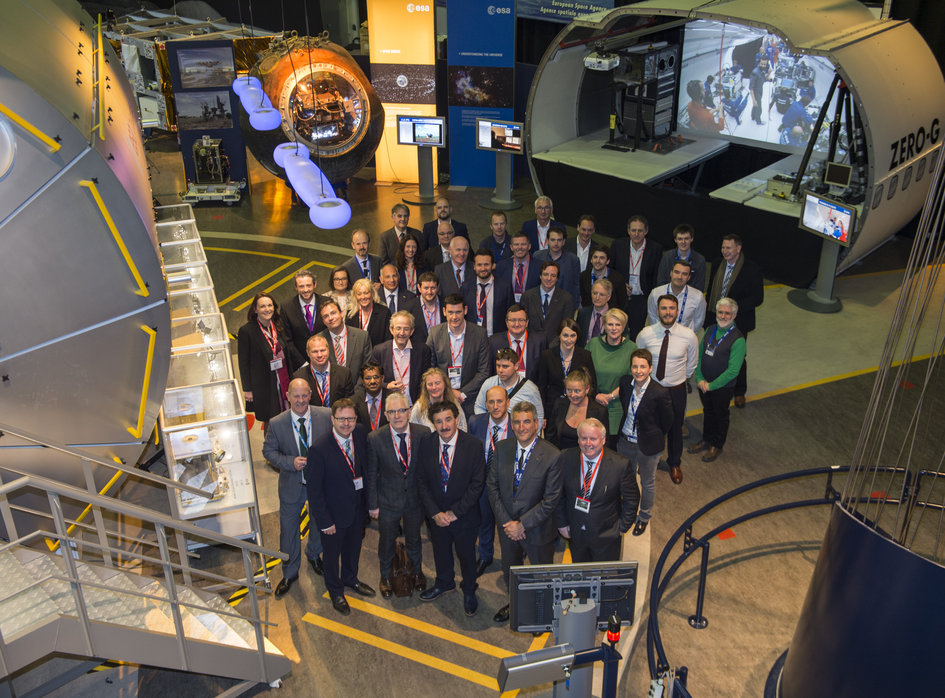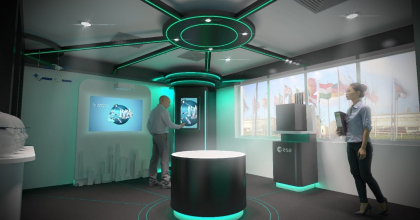A series of recent developments highlight the growth of the Irish space industry and the important role ESA’s ARTES Programme is playing.
On 24 April, during Enterprise Ireland’s trade visit to ESA’s ESTEC site in Noordwijk (NL), led by John Halligan T.D., Ireland’s Minister for Training, Skills & Innovation, two ARTES contracts with Irish SMEs were signed.
In the first, Irish SME ENBIO has signed a contract worth €650k with ESA to develop advanced surface coatings for Neosat, Europe’s next generation satellite platform for mid-size telecommunications missions that is being developed with ARTES support. ENBIO’s new thermal coatings offer a major improvement in the performance of thermal management systems, allowing for more powerful satellites with greater bandwidth capacity.
Over the past six years, ENBIO has benefitted from the Irish government’s increased support for ESA. Through Enterprise Ireland, ENBIO has been able to compete for opportunities and is now successfully coating satellite components for many European satellite manufacturers. The company has grown from six people to its present size of sixteen.
laser communications
The second announcement concerned a contract worth €335,000 awarded to Pilot Photonics by ESA to develop laser communications sub-systems for use in a range of advanced communications satellite systems. Pilot Photonics’ technology is an extremely versatile laser system, known as an optical comb source, that can enable constellations of satellites to communicate at much higher speeds. This is important for handling the large volumes of data that satellites currently gather and transmit for communication, earth science, agriculture, ocean and weather monitoring and transport logistics.
Pilot Photonics is a technology start-up based in Dublin which emerged as a spin-out from Dublin City University with the support of Enterprise Ireland. The company’s laser technology was developed through publicly-funded research over a ten-year period.
The ARTES contract will contribute to Pilot Photonics doubling its workforce to ten people over the coming twelve months.
In other Ireland-related news, ESA and Dublin City University will shortly be announcing the launch of Maker Space, an initiative to support and promote the applications of Machine to Machine (M2M) and Internet of Things via satellite communications. The activity is centred at DCU Alpha, the University’s Innovation Campus. The DCU Maker Space environment will provide opportunities for rapidly prototyping and validating design concepts proposed by students, experts, engineers, academics, makers, and artists.
Through the ARTES programme, ESA is providing funding of €500,000 to Maker Space M2M/IoT, which should run from between a year to eighteen months. During the course of the project some twelve design and development challenges will be published by Maker Space, to which prospective individuals, teams and companies can propose solutions. Maker Space will be fully funding proposals for between €5,000 and €20,000 per activity. Through the initiative, ESA will engage with a wide variety of parties with whom the Agency has never previously worked.
Welcoming these announcements and the ESA support, Tony McDonald Irish National Delegate to ESA, stated that these activities reflect the highly dynamic nature of the space technology sector in Ireland . “We are seeing significant growth in the satcoms sector in particular, mainly involving SMEs and startups bringing technology innovation to a range of space systems and applications, including optical communications, advanced materials and Internet of Things.”





